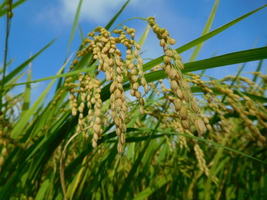
Research Unlocks Rice Gene Diversity for Food Security
May 2, 2018| |
 A new study opens the possibility of accelerating rice breeding to help achieve food security for some of the world's most vulnerable rice farmers. A collaboration among the International Rice Research Institute (IRRI), the Institute of Crop Sciences of the Chinese Academy of Agricultural Sciences (CAAS), BGI-Shenzhen, and 13 other partner institutions, the research will enable scientists and breeders to discover new gene variants and characterize known genes for important traits, such as disease resistance and tolerance to floods, drought, and salty water. Additionally, molecular breeders could use the genetic markers to select rice plants that are more likely to carry a desired trait before they are planted in the field.
A new study opens the possibility of accelerating rice breeding to help achieve food security for some of the world's most vulnerable rice farmers. A collaboration among the International Rice Research Institute (IRRI), the Institute of Crop Sciences of the Chinese Academy of Agricultural Sciences (CAAS), BGI-Shenzhen, and 13 other partner institutions, the research will enable scientists and breeders to discover new gene variants and characterize known genes for important traits, such as disease resistance and tolerance to floods, drought, and salty water. Additionally, molecular breeders could use the genetic markers to select rice plants that are more likely to carry a desired trait before they are planted in the field.
Results of the research revealed that, among the 3,000 rice genomes, there are significant variations in gene content and immense sequence variation. Researchers identified more than 10,000 new rice genes and over 29 million simple variations throughout the genome. Additionally, within the two major rice variety groups, the analysis revealed the existence of previously unreported populations that are unique to specific geographic origins. Other evidence revealed that Asian rice was domesticated multiple times thousands of years ago.
"This information leads to faster and more accurate development of varieties suited to various agricultural environments, especially for unfavorable rice-growing areas where the poorest and most vulnerable farmers reside," says Dr. Jacqueline Hughes, IRRI's Deputy Director General for Research.
Dr. Kenneth McNally, IRRI senior scientist, said that this is the largest set of genomic variants discovered for a crop species that is freely and publicly available for plant breeders and scientists across the world. It already serves as material for training a new generation of plant biologists.
For more details, read the media release from IRRI.
| |
Biotech Updates is a weekly newsletter of ISAAA, a not-for-profit organization. It is distributed for free to over 22,000 subscribers worldwide to inform them about the key developments in biosciences, especially in biotechnology. Your support will help us in our mission to feed the world with knowledge. You can help by donating as little as $10.
-
See more articles:
-
News from Around the World
- Borlaug Global Rust Initiative Honors Women in Wheat Research
- WEMA Maize Shows Promising Resistance to Fall Armyworm in Mozambique
- Researchers Move Toward Better Understanding of Deadly Citrus Disease
- Cotton Research Goes to Space
- Research Unlocks Rice Gene Diversity for Food Security
- Plant Scientists Boost Malaria Drug Yield in Plant
- Why Grass Cereals Are More Drought-tolerant Than Other Plants
- Europe's Current Approach to Food, Agriculture, and the Environment Not Sustainable, say European National Science Academies
-
Research Highlights
- SlAGL6 Gene is Key to Parthenocarpy in Tomato
- PcWRKY33 Gene from Japanese Knotweed Reduces Salt Tolerance in Transgenic Arabidopsis
- Gene from Wild Peanut Enhances Biotic and Abiotic Resistance in Tobacco
-
Beyond Crop Biotech
- The Effect of Single Metal Nanoparticles on Transformation Efficiency of Soybean
- FDA Approves Application for AquaBounty Salmon Facility in Indiana, USA
-
Announcements
- World Biotechnology Conference
-
Plant
- Wageningen University & Research Releases Booklet on New Plant Breeding Techniques
- CRISPR-Knockout of OsFAD2-1 Gene Improves Rice Bran Oil Health Benefits
- Japanese Researchers Establish New Cas9 Variant
- Early Leaf Senecence and Salt Stress Response Gene Found in Rice
-
Read the latest: - Biotech Updates (December 17, 2025)
- Gene Editing Supplement (December 17, 2025)
- Gene Drive Supplement (February 22, 2023)
-
Subscribe to BU: - Share
- Tweet
